Exploring Careers in the Mortuary Industry
If you're searching for information about job mortuary opportunities, here's what you need to know:
- Entry-level positions: Mortuary assistant, morgue attendant, removal technician
- Education required: Associate's degree in mortuary science for licensed positions
- Median annual wage: $49,800 for morticians and funeral arrangers
- Job outlook: 4% growth (2023-2033) with approximately 5,800 openings annually
- Work environment: Funeral homes, hospitals, medical examiner offices
- Key skills: Compassion, attention to detail, emotional resilience, technical abilities
The mortuary industry offers a unique career path for those drawn to providing essential, compassionate care during life's most difficult moments. These careers combine technical expertise with interpersonal skills, creating meaningful work that serves communities during their most vulnerable times.
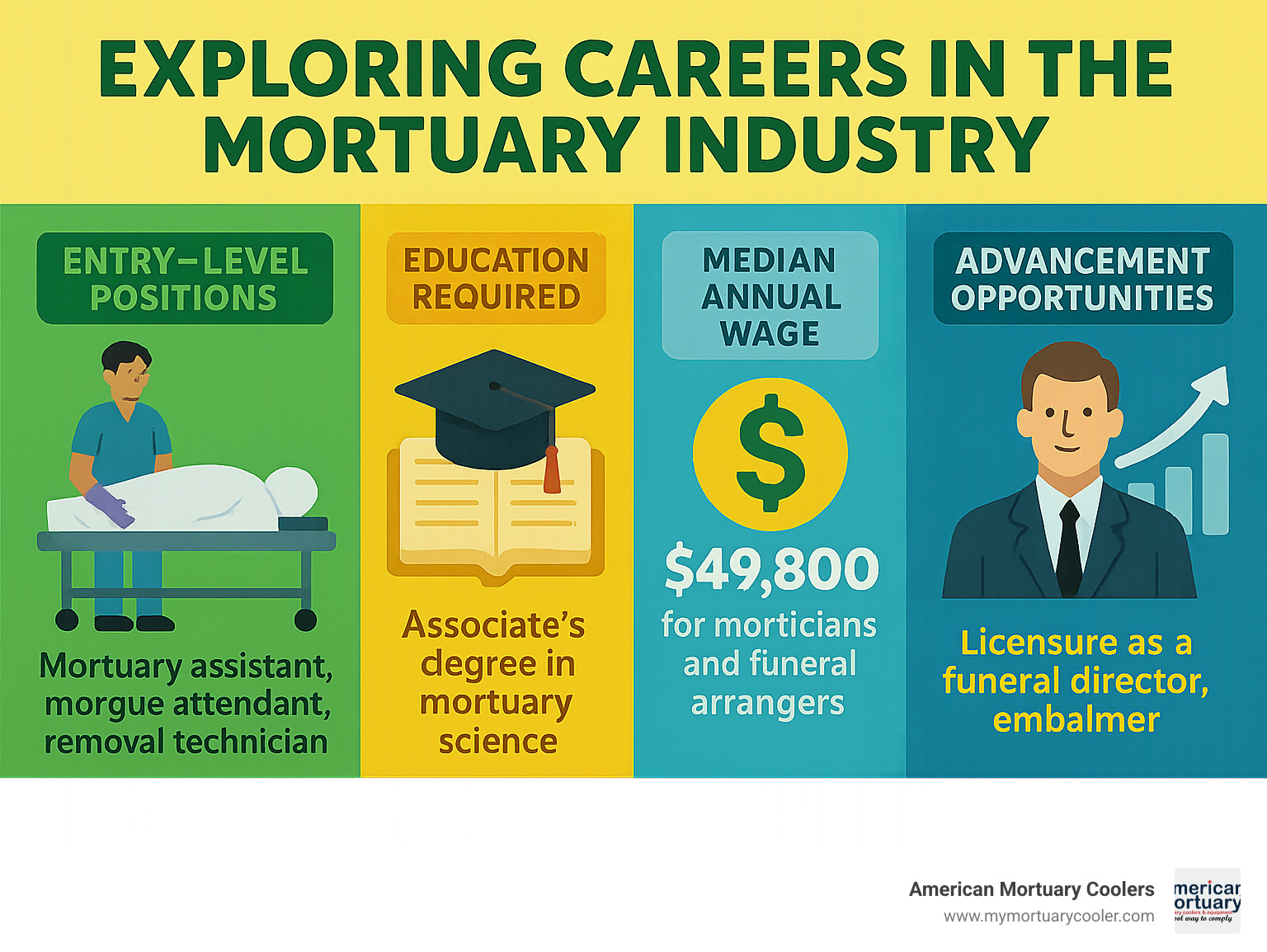
Understanding the Job Mortuary Landscape
The job mortuary field offers a variety of meaningful careers, each playing a vital role in providing dignified care for the deceased and compassionate support for families.
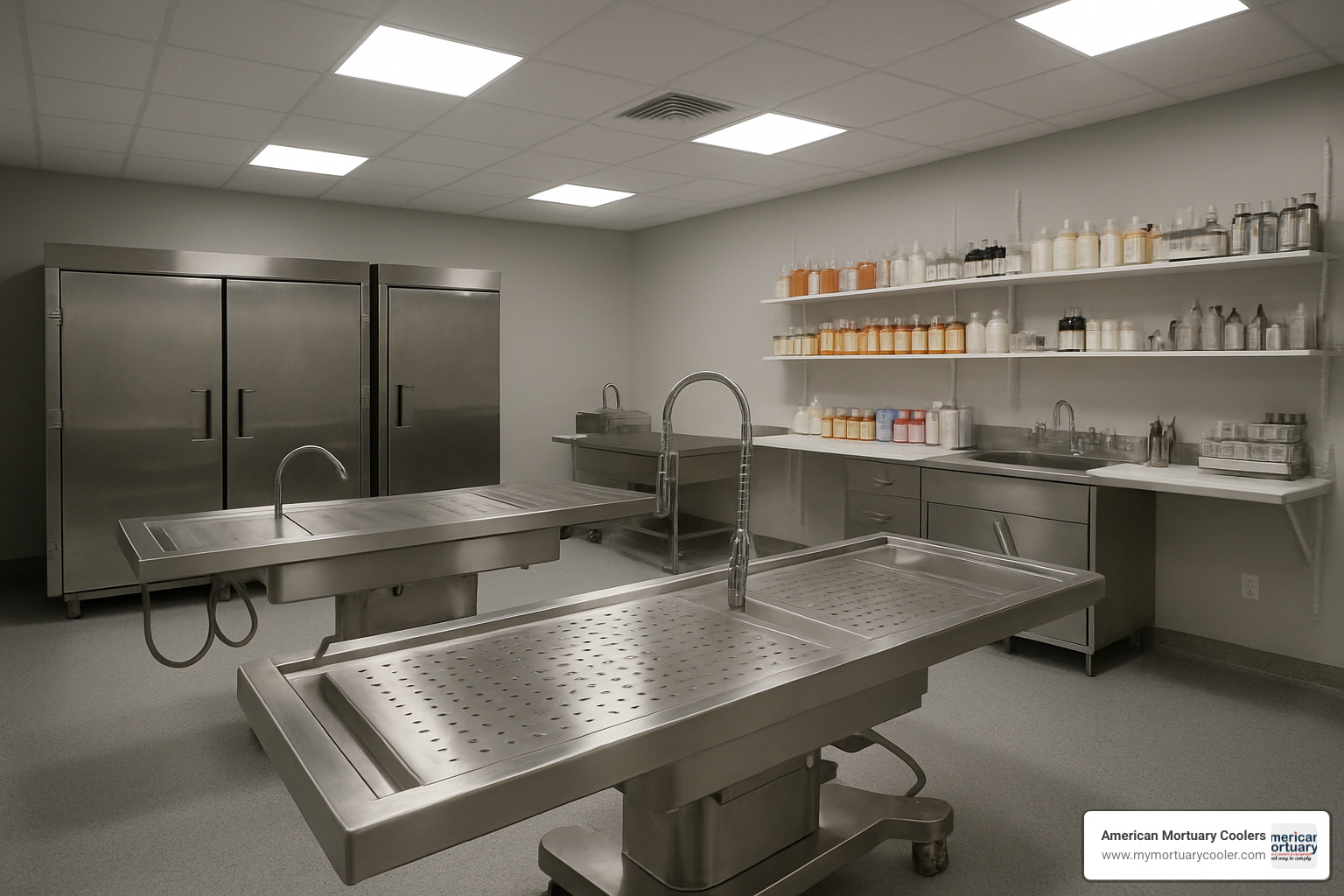
Common Job Titles in a Mortuary
When people ask about job mortuary positions, they're often surprised by the variety of roles available:
- Morticians/Funeral Directors: Manage arrangements, prepare the deceased, and guide families through difficult decisions. Requires an associate's degree in mortuary science and state licensure.
- Embalmers: Focus on preservation, using specialized chemical treatments to prepare bodies for viewing. Requires specific training and certification.
- Morgue Attendants: Maintain facilities, assist with procedures, and manage record-keeping. Often entry-level positions requiring a high school diploma with on-the-job training.
- Mortuary Assistants: Support licensed staff in body preparation and facility maintenance, providing valuable experience while pursuing further education.
- Crematory Operators: Manage the cremation process, requiring specialized training and often CANA certification.
- Removal Technicians: Transport the deceased from the place of death to the funeral home or morgue, requiring minimal formal education but physical capability and emotional strength.
How Funeral Homes, Morgues, and Crematories Differ
| Setting | Primary Function | Family Interaction | Equipment Needs | Typical Staff |
|---|---|---|---|---|
| Funeral Home | Arranging services, body preparation, viewing | High - direct client service | Embalming equipment, caskets, viewing rooms | Funeral directors, embalmers, assistants |
| Morgue | Body storage, autopsy, identification | Limited - mostly professional | Coolers, autopsy tables, specimen storage | Morgue attendants, medical examiners, pathologists |
| Crematory | Body cremation | Varies - may be integrated with funeral home | Cremation chambers, processing equipment | Crematory operators, technicians |
Future Demand & Salary Snapshot
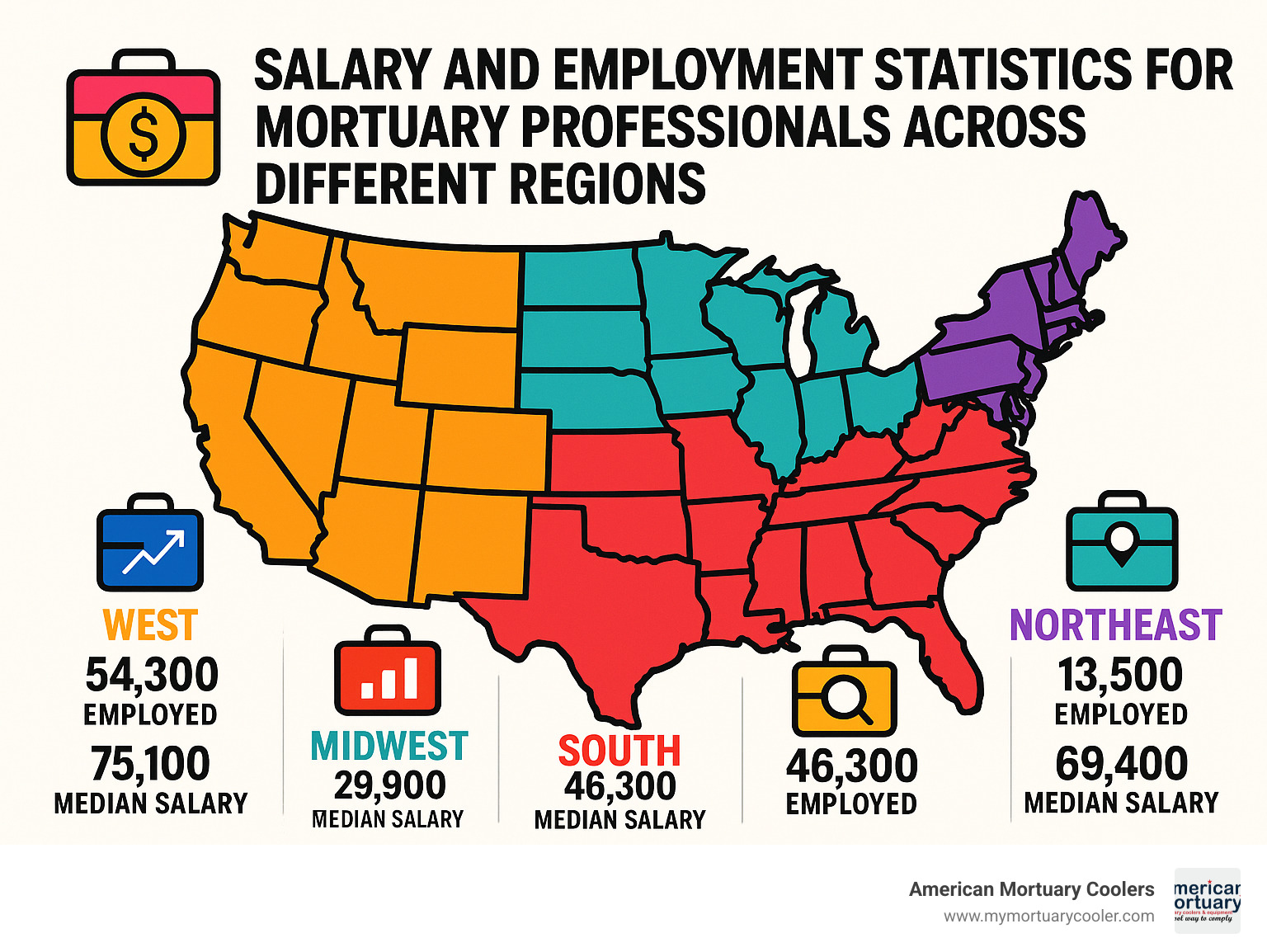
Recent data shows employment of funeral service workers growing at about 4% from 2023 to 2033, with approximately 5,800 new openings annually. Morticians, undertakers, and funeral arrangers earn a median annual wage of $49,800, while funeral home managers can expect higher earnings, with a median of $76,830 annually. For a deeper dive into national employment trends, visit the U.S. Bureau of Labor Statistics.
The 7 Smart Strategies to Land Your First Role
Breaking into the job mortuary field isn't just about finding a job—it's about launching a meaningful career where compassion meets technical skill.
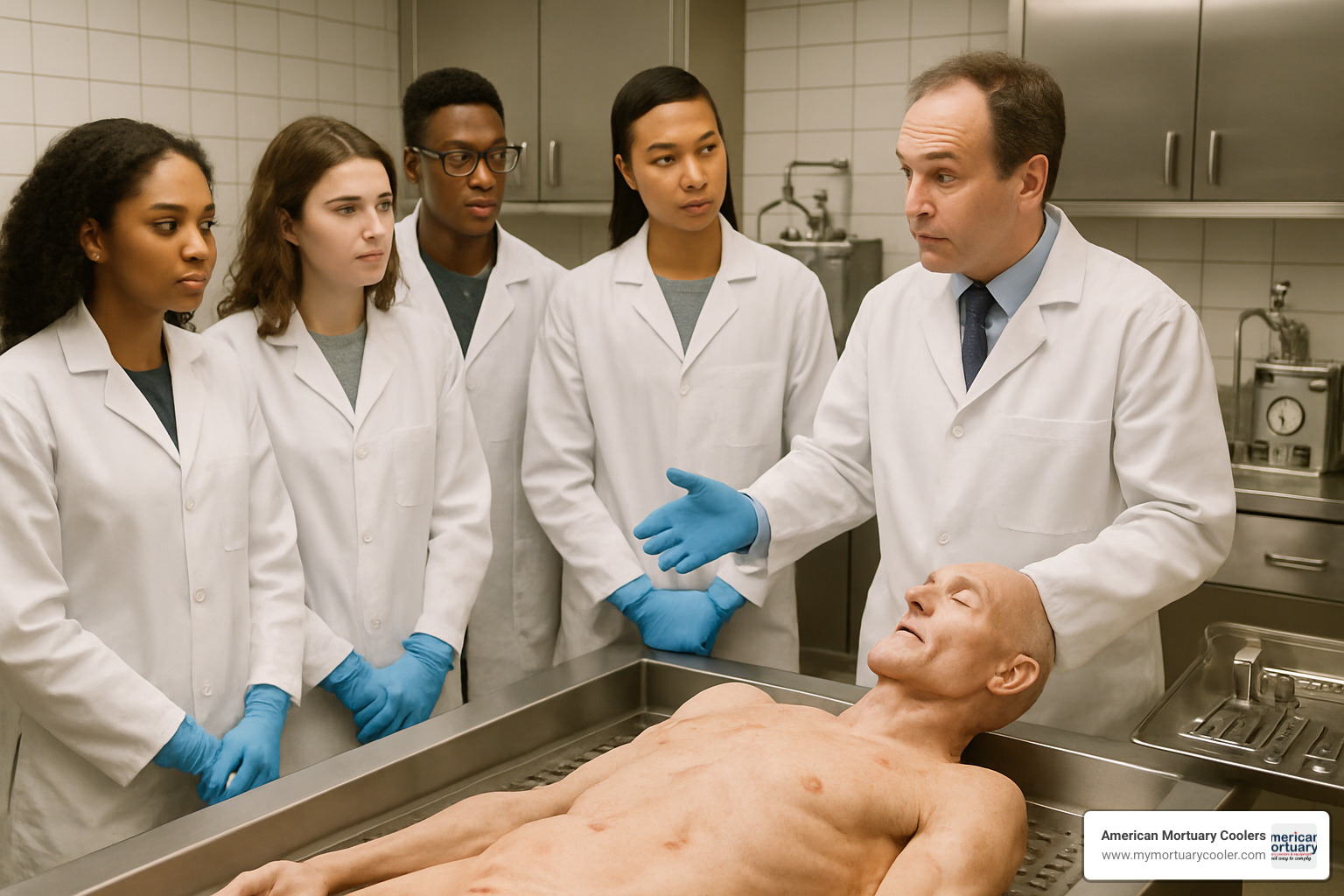
The path to your first job mortuary position requires thoughtful planning—from education to networking. While the industry might seem mysterious to outsiders, there's a clear roadmap that successful professionals follow. These seven proven strategies will help you not just get hired, but thrive in this rewarding field.
This industry values both technical competence and genuine compassion. The professionals who succeed long-term understand that this career is as much about serving families during their most vulnerable moments as it is about the technical aspects of care for the deceased.
1. Map Your Education & Licensure
Starting your job mortuary career begins with getting the right education and credentials:
- Associate's degree in funeral service or mortuary science from an ABFSE-accredited program
- Apprenticeship lasting 1-3 years under a licensed funeral director
- National Board Exam administered by the International Conference of Funeral Service Examining Boards
-
State licensing requirements typically include:
- Minimum age of 21
- Background checks
- Accredited degree
- Documented apprenticeship
- National and state-specific exams
- Application fees ($50-$570)
Licensing isn't a one-time event—most states require continuing education to maintain your credentials.
The Ultimate Guide to a Mortuary Science Bachelor's Degree offers more detailed information about advanced education options.
2. Gain Hands-On Experience Early
Getting hands-on experience in the job mortuary field before graduation can make all the difference in your career trajectory:
- Job shadowing at local funeral homes or morgues gives you exposure to daily operations
- Volunteer opportunities at hospitals and medical examiner offices provide insights into the clinical side of death care
- Part-time positions in funeral homes, even in reception or administrative roles, immerse you in the culture and operations
- Mortuary transport work requires just a clean driving record and professional demeanor, teaching dignity in handling and proper transfer techniques
- Internships at different types of facilities create a well-rounded perspective that employers value
- Informational interviews with experienced professionals reveal the unvarnished reality of daily responsibilities
Candidates who gather diverse early experiences adapt more quickly when they step into full-time mortuary work and develop a clearer sense of which specialization truly suits their temperament and talents.
3. Build a Job Mortuary Skill Set
Working in a mortuary requires balancing precision with compassion in every interaction. The skills you'll need blend science, art, and humanity in a unique way:
- Technical skills: Familiarity with embalming tools, restorative art techniques, and preservation methods
- Interpersonal abilities: Exceptional customer service during families' most vulnerable moments
- Documentation: Meticulous record-keeping for legal requirements
- Attention to detail: Ensuring perfection in everything from chemical mixtures to paperwork
Don't worry about mastering everything at once. Most skills develop through hands-on practice under experienced mentors. Start with fundamentals like proper body handling, basic preparation techniques, and professional communication.
The Science of Embalming provides a foundation, but staying curious helps you grow throughout your career.
4. Cultivate Emotional Resilience for Job Mortuary Careers
Working with the deceased and grieving families requires emotional resilience. Those who thrive long-term in job mortuary careers develop effective ways to process what they experience:
- Understanding grief dynamics helps you recognize your own emotional responses while supporting others
- Creating boundaries between work and personal life is essential for maintaining balance
- Self-care routines including exercise, quality sleep, proper nutrition, and mindfulness practices are requirements, not luxuries
- Building a support network of colleagues who understand the unique challenges provides an outlet for processing difficult cases
- Recognizing compassion fatigue signs like emotional numbness or increased irritability helps you know when to seek additional support
- Reconnecting with meaning behind your work reminds you of the essential service you provide during difficult times
Those who develop these emotional resilience skills tend to have the longest, most satisfying careers in the job mortuary field.
5. Master Health, Safety & Legal Compliance
Working in the job mortuary field requires understanding important safety protocols and regulations:
- Personal protective equipment (PPE) including gloves, gowns, face shields, and respirators is essential when handling deceased individuals and preservation chemicals
- Chemical safety knowledge, including understanding Safety Data Sheets and proper ventilation requirements
- OSHA's bloodborne pathogen standards protect you when handling potentially infectious materials
- Ergonomic practices and proper lifting equipment prevent back injuries
- FTC Funeral Rule governs how you present pricing and options to families
- HIPAA regulations dictate how you handle sensitive information
- Chain-of-custody documentation is crucial for medical examiner cases
- Death certificate requirements must be followed precisely to avoid delays for families
- Transportation regulations apply when handling cases across state lines or internationally
Mastering these protocols creates a foundation of safety and compliance that allows you to provide compassionate service without compromising your wellbeing or legal obligations.
6. Network Through Industry Associations & Job Boards
Building a strong professional network can open doors in the close-knit job mortuary world:
- National Funeral Directors Association (NFDA) offers networking events and continuing education
- Cremation Association of North America (CANA) provides specialized certification programs
- State funeral directors associations understand local regulations and often maintain current job listings
- Specialized websites like ConnectingDirectors.com and FuneralHomeJobs.com focus exclusively on death care positions
- Government job portals list openings at medical examiner offices
- Direct outreach to funeral homes can be effective, as many smaller establishments don't formally advertise openings
- Industry trade shows and conferences provide opportunities to make connections that can shape your career path
Networking in this field is about building genuine relationships, not just collecting contacts. Approach networking with authenticity and a sincere desire to learn from others' experiences.
7. Craft an Application that Stands Out in the Job Mortuary Market
When applying for your first job mortuary position, make your application rise to the top:
- Tailor your resume and cover letter to showcase your understanding of mortuary work
- Highlight relevant coursework in areas like embalming techniques or grief psychology
- Balance technical competence and compassionate service in your application materials
- Research the facility beyond just checking their website to understand their history and service offerings
- Avoid clichés like "I've always been fascinated by death" during interviews
- Dress conservatively and arrive early, demonstrating the punctuality essential in this time-sensitive field
- Bring supporting materials including copies of credentials, professional references, examples of restorative art work, and a clean driving record
- Send a handwritten thank-you note within 24 hours, referencing specific points from your conversation
Employers in this field value professionalism, meticulous attention to detail, and genuine commitment to service above all else.
Tools, Technology & Safety Gear You'll Use Daily
Understanding the specialized equipment used in mortuary work can help you feel more confident as you begin your job mortuary career.
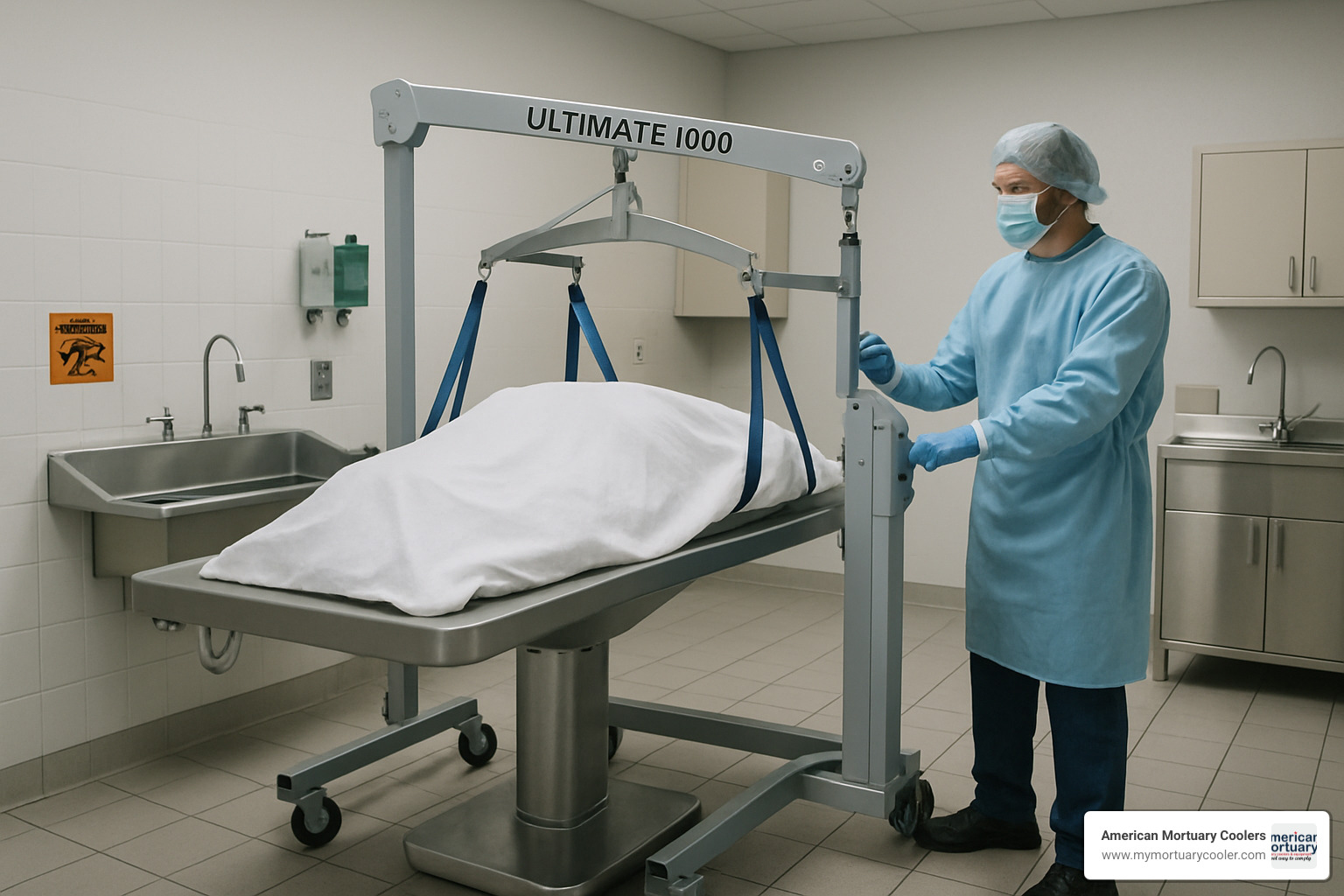
Preparation-Room Essentials
- Embalming machine: A precision pump that circulates preservation fluids
- Trocar: A long, hollow tube for aspirating body cavities and introducing cavity fluid
- Aneurysm hooks and arterial tubes: Help locate, raise, and cannulate arteries during embalming
- Surgical instruments: Scalpels, scissors, and forceps used for various preparation procedures
- Mortuary coolers: Maintain bodies at 36°F-39°F to slow decomposition
- Mortuary table: Your workstation, equipped with drainage systems
- Professional-grade cosmetics: Used to present the deceased in a way that brings comfort to families
Protective Equipment & Ergonomic Aids
- Personal protective equipment (PPE): Nitrile gloves, face shields/goggles, fluid-resistant gowns, and respiratory protection
- Body handling equipment: The Ultimate 1000 Lift helps prevent back injuries when transferring bodies
- Adjustable mortuary cots, body boards, sliders, and gantry systems: Contribute to safer transfers and positioning
- Disinfection equipment: Specialized cleaners for mortuary surfaces and instrument sterilization systems
At American Mortuary Coolers, we've designed our equipment with input from funeral professionals who understand the daily realities of job mortuary work.
Frequently Asked Questions about Mortuary Jobs
What qualifications do I need to start?
The mortuary field offers multiple entry points:
- Entry-level positions like removal technicians or mortuary assistants typically need just a high school diploma
- Licensed positions require an associate's degree in mortuary science from an ABFSE-accredited program, a 1-3 year apprenticeship, and passing national and state licensing exams
- Requirements vary by state - check with your state's funeral service board for specific requirements
How much can I earn in a beginning position?
- Entry-level positions: $31,470-$40,000 annually
- New licensed funeral directors/embalmers: $40,000-$55,000
- Government positions like morgue attendants: $43,683-$57,142 annually
- Experienced funeral directors: Median of $49,800, with top 10% making more than $85,940
- Funeral home managers: Median annual wage of $76,830
Benefits packages vary widely across the industry, with larger corporate funeral homes typically offering more comprehensive benefits.
Is mortuary work emotionally overwhelming?
Working in a job mortuary environment means regular exposure to grief, loss, and sometimes traumatic situations. However, many find this work deeply rewarding despite these challenges.
Emotional sustainability in this field comes down to developing healthy boundaries, building a strong support network, and practicing consistent self-care routines.
Many find profound meaning in providing essential services during families' most difficult moments. The industry is also evolving in its approach to staff well-being, with many funeral homes now offering resources such as counseling services and mental health days.
Conclusion
The job mortuary field offers a unique career path for those drawn to meaningful service during life's most difficult moments. While this work presents both technical and emotional challenges, it also provides the profound satisfaction of helping families steer loss with dignity and compassion.

Success in this field combines technical knowledge with genuine empathy and emotional resilience. The seven strategies we've outlined provide a practical roadmap for entering and thriving in this profession.
At American Mortuary Coolers, we support mortuary professionals across the country with high-quality, custom-designed equipment that improves both safety and dignity in end-of-life care. Based in Tennessee with distribution throughout the contiguous 48 states, we understand the unique challenges of daily mortuary operations.
Whether you're just beginning your journey or looking to advance your existing career, we're here as a resource. Visit our website to explore our full range of mortuary coolers and equipment.
Few careers offer the same opportunity to provide such meaningful service exactly when it matters most. With proper preparation and the right support, your career in the mortuary field can be both sustainable and deeply rewarding.

















